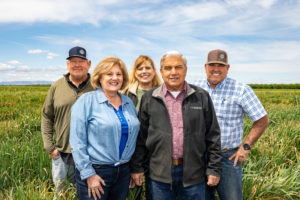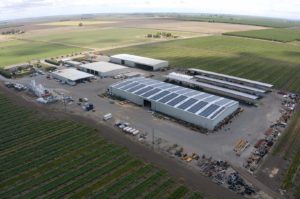Growing Together Spring 2022
Hard Work, Diversification Are the Past, Present and Future for Robben Ranch
About a decade after starting his family operation, Gene Robben found himself at about the lowest spot possible for a farmer and rancher to whom agriculture is everything. It’s a point many like him have reached and from which not as many have recovered.
“Hard times,” said Gene, the now 71-year-old patriarch of Robben Ranch.
“Times were tough. 1981 almost took us down,” said Spencer, Gene’s 51-year-old son who works alongside his parents and brother Scott, 50, to manage the family operation. Today, their family operation — including Scott and Spencer, mother Liz and sister Amanda — comprises multiple business units, maintains a beef cattle herd and raises as many as 10 crops each year.

What started out as a beef cattle ranch nearly 50 years ago is today a broadly diversified operation. Each new addition over the years has been deliberate and based on lessons learned along the way, hence the general success of the evolution.
“That’s the level of commitment it takes to be successful in this arena at this time,” Spencer said. It’s a philosophy that’s been fundamental to how the family has diversified its Dixon, California-based farm and ranch.
The right opportunities, people and time
Today, Spencer and Scott manage S&S Farms, the family’s row crop operation. The family and its workforce also manage Robben Orchard Company, Robben Land Company and a trucking division under the Robben Ranch umbrella. Though a cow/calf herd is still a large part of the operation, the family’s added almonds, sunflowers, tomatoes, dry beans, corn, wheat, alfalfa, Sudan grass, grain hay and sugar beets over the years. Some ventures have come and gone, while others remain today.

The boys describe Gene — who took the reins in 1980 after buying his father’s beef cow herd — as the “driver” of the operation who instilled into his family the importance of hard work. Rarely does a member of the Robben family slow down. And that philosophy was there from the day Spencer and Scott began working into the operation.
“When we were growing up, we worked on the farm, then our parents said ‘Hey boys, go get an education and make good on what you’ve learned. It was never ‘Hey, get an education and you’re coming back to the farm,’” Spencer said reflecting on when he finished college at Cal Poly. “Scott got a degree in business and I got a degree in crop science. Our parents gave us the opportunity to add what we learned in school if we wanted to.”
The combination of work ethic and willingness to diversify will be fundamental as the brothers integrate their now-college-age children into the operation much like Gene and Liz did for them. They both plan to offer the same opportunity to their own children, especially given its importance to the future of Robben Ranch and its future diversification of the next generation.
What the Robbens’ diversification means on the ground level
Maintaining a resilient, economically viable operation like the Robben’s doesn’t happen overnight. Economics is the obvious driver of every step toward a more diversified operation, Scott said. Especially considering the investment required in most cases, every new crop or business unit added must offer revenue potential well into the future. Scott points to sugar beets as an example; years ago, the family raised them on up to 2,000 acres, but when revenue dwindled, the family moved away from the crop.
“Thinking about diversification every year helps us stay adaptable,” Scott said. “We’re always looking down the road for different sources of income and thinking about things like labor and how they contribute to revenue potential. By thinking about it all the time, we are able to react quickly when markets show us where we can make money.”
But it’s not always cut-and-dried. Agriculture is cyclical, as is the revenue potential of individual crops and products. Spencer thinks about this often as he considers future diversification through the lens of what’s worked — and what hasn’t — in the past. Both boys always looking for new tools and technology like efficient machinery, precision irrigation and crop fertility innovations that contribute to the operation’s resilience.
“There are always peaks and valleys, but we work hard to flatten those curves. We do that through diversification, vertical integration, being progressive with technology and spreading out equipment, labor and supplies across multiple crops when we can,” he said. “It’s like building a chair: four legs are great, but if we can somehow add more legs, that will always be better.”
The importance of a team approach
Ask any member of the Robben family and they’re all quick to say they couldn’t do everything they do on their own. It’s truly a team approach; while they work hard to fairly compensate their workforce for their productivity and loyalty, labor is just part of the equation for Gene, Spencer and Scott. “We have surrounded ourselves with honest, hard-working people” Gene said. Case in point: They’ve worked with Grow West and its predecessor companies for decades. This collaboration has contributed to the family’s ability to evolve, diversify and stay adaptable.
“We’ve had relationships with the Grow West team for years. When my brother and I were in college, our current Grow West PCA was one of our good friends,” Spencer said. “We know that the Grow West approach to business — having good people you can trust to do a good job — matches ours. We rely on them for service, support, know-how and knowledge. But it’s their loyalty that bonds us all together. Grow West is an extension of our family.”
Looking down the road, Spencer said his family will sharpen its focus on what they can do to ensure the operation is well-positioned for the next generation to take the reins when the time is right. Though the specific diversification to make that happen remains unclear, one thing is certain: Robben Ranch will be around for a long time.
“Our children have a responsibility in our succession plan, and we will rely on them to bring a new vision to the table. Will that mean developing a construction division, growing olives and pistachios, or getting more into the fresh market? That remains to be seen,” Spencer said. “We don’t make decisions based on short-term thinking. Our lineage is here to stay, and we’re going to get through any hard times. We’re here now and we’re going to be here tomorrow.”
